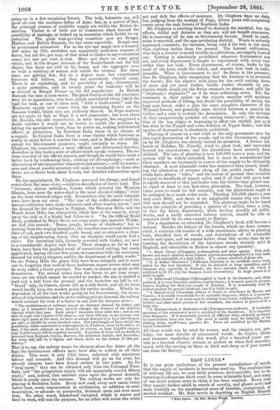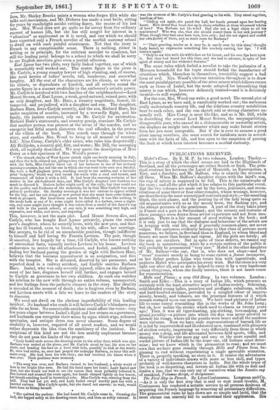tiers, Mr. Shirley Brooks paints a woman who forges filth
while she talks auti-nomianism, and Mr. Dickens has made a mad bride, sitting
for years by candlelight amidst rotting finery, the centre of his last tale. Mrs. Wood does not go quite so far astray from the ordinary current of human life, but she has still sought for interest in a "situation" as unpleasant as it is novel, and one which we should have expected only a French novelist of the morbid anatomy school to dwell on with such painful minuteness. Not that the story is French in any exceptionable sense. There is nothing, either in writing or in principle, for the strictest moralist to condemn, but still the leading point belongs to a school to which we shall be sorry to see English novelists give even a partial adhesion.
East Lynne has two plots, very fairly linked together, one of which is remarkably well worked out. The centre figure in the piece is
Mr. Carlyle, a young country lawyer of high standing, and, of course, like most heroes of ladies' novels, tall, handsome, and somewhat haughty. All the rest of the characters are his clients, or wives of his clients, or dependents or kinsfolk, and all revolve round the centre figure in a manner creditable to the authoress's artistic power. Mr. Carlyle is involved with two families of the neighbourhood—Lord Mount Severn, of East Lynne, a weak, good-natured, ruined peer, with an only daughter, and Mr. Hare, a country magistrate, honest, ill- tempered, and prejudiced, with a daughter and son. The daughter, Barbara Hare, loves Carlyle secretly, and the son, Richard Hare, lies under suspicion of murder, increased by a cowardly flight, and his family, the justice excepted, rely on Mr. Carlyle for extrication. Richard Hare's statements, and country gossip, convince Mr. Carlyle that another person was present at the scene of the murder, and an energetic but fitful search discovers the real offender, in the person of the villain of the book. This search runs through the whole story, and enables Mrs. Wood to bring in all manner of country- folk : Miss Corny, Carlyle's elder sister, who rules him despotically; My Hallijohn, a country girl,.ffirt, and worse; Mr. Dill, the managing clerk, all capitally described. We may quote the description of Miss Corny as a fair specimen of Mrs. Wood's power :
"The church clocks of \Vest Lynne struck eight one lovely morning in July, and then the bells chimed out, giving token that it was Sunday. Simultaneously with the bells, Miss Carlyle burst out of her bedroom in one of her ordinary morningcostnmes, but not the one in which she was wont to be seen on a Sunday. She wore a buff gingham gown, reaching nearly to her ankles, and a lavender print 'bedgown,' which was tied round the waist with a cord and tassels, and ornamented off below it with a frill. It had been the morning costume of her mother in the old-fashioned days, and Miss Carlyle, despised new fashions too much to discard it. Modern ladies might cavil at the style, but they could not at the quality and freshness of the materials, for in that Miss Carlyle was scru- pulously particular. On Sunday mornings it was her custom to appear attired for the day, and her not doing so now proved that she must have some domestic
work in prospect. Her head-dress cannot be described; it was like nothing in the mode book or out of it: some might have called it a turban, some a night-
cap, and some might have thought it was taken from a model of the dunce's cap and bells in the parish school; at any rate, it was something very high, and expansive, and white, and stern, and imposing."
This, however, is not the main plot. Lord Mount Severn dies, and Carlyle, who has bought Vast Lynne privately, places the ruined peer's daughter, whom he secretly loves, with the new peer, and find- ing her ill treated, even to blows, by his wife, offers her marriage. She accepts, to be rid of an unendurable position, though indifferent to himself and half lovino. Sir Francis Levison. The pair, though ill assorted, live happily for a time, till Carlyle, who knows nothing of antecedent facts, casually invites Levison to his house. Levison endeavours to revive the old attachment, and Isabel, maddened by finding her husband pacing the garden at night with Barbara Hare, believes that the business appointment is an assignation, and flies with the tempter. She is divorced, deserted by her paramour, and reported dead in a railway accident, and Carlyle marries Barbara Hare. Isabel, who was only severely injured, relies on the disfigure- ment of her face, disguises herself still further, and engages herself to Carlyle as governess to her own children. As such she watches his relation to the new wife through an entire volume, unsuspected, and her feelings form the pathetic element in the story. Her identity is revealed at the moment of death ; she is forgiven even by Barbara, and Levison meets with a fate we leave to the readers of the story to discover.
We need not dwell on the obvious improbability of this leading incident. No husband who reads it will believe Carlyle's blindness pos- sible for an hour. No conceivable accident could affect the voice : very few years elapse between Isabel's flight and her return as a governess, and husbands can recognize their wives by signs which wigs, coloured spectacles, and antique dress can never obscure. Some degree of credulity is, however, required of all novel readers, and we would rather deprecate the idea than the machinery of the incident. De- scriptions of this kind are not the less acutely unpleasant because they do not pass the limits of the proper.
" Lady Isabel stole across the drawing-room to the other door, which was ajar. Barbara was seated at the piano, and Mr. Carlyle stood by her, his arm on her chair, and bending his face on a level with hers, possibly to look at the music. So, once had stolen, so, once had peeped the unhappy Barbara, to hear this self- same song. She had been his wife then ; she had received his kisses when it
was over. Their positions were reversed. * * "The song was over, and Barbara turned to her husband, a whole world of love in her bright blue eyes. He laid his hand upon her head; Lady Isabel saw that, but she would not wait to see the caress that most probably followed it. She turned and crossed the room again, her hands clasped tightly on her bosom, her breath catching itself in hysterical sobs. Miss Carlyle was entering from the ball. They had not yet met, and Lady Isabel swept meekly past her with a hurried curtsey. Miss Carlyle spoke, but she dared not answer: to wait, would have been to betray herself.
"She quitted the parlour. She had heard Mr. Carlyle come in. Crossing the ball, she tapped softly at the drawing-room door, and then as softly entered. It was the moment of Mr. Carlyle's fond greeting to his wife. They stood together, heedless of her.
" Gliding out again, she paced the hall, her hands pressed upon her beating heart. How dared th.t heart-rise up in sharp rebellion at these witnessed tokens of love? Was Barbara not Ilk wife? Had she not a legal claim to all his tenderness? Who was she, that she should resent them in her sick jealousy? What, though they had once been hers, hers only ; had she not signed and sealed
her owmforteit of them, and so made room for Barbara? • a *
" ' Their greeting, tender as it may be, is surely over by this time• ,' thought
Lady Isabel, an expression something like mockery curving her lips. ' I wilt venture again.'
" Only to see him with his wife's face on his breast, and his own lips bent upon it. But they had heard her this time, and she had to advance, in spite of her spirit of misery and her whitened features."
The same rules which forbid a novelist to take the jealousies of a Mormon household for his topic should forbid the manufacture of situations which, blameless in themselves, irresistibly suggest a bad form of evil. Mrs. Wood's obvious intention throughout is to draw the most painful picture possible of the utter misery which follows errors such as those of Isabel, but the mode adopted for intensifying that misery is one which, however delicately treated—and it is delicately treated—is still repulsive. For the rest, Mrs. Wood can write a good novel. The second plot of East Lynne, as we have said, is excellently worked out; the authoress really understands country life, and the relations country notabilities bear to each other, and she can sketch odd or strong characters un- usually well. Miss Corny is most life-like, and so is Mr. Dill, while in describing the second Lord Mount Severn, the unsympathizing, disagreeable peer, who cannot do a dishonourable or unworthy action, she displays an insight into character which may make future stories from her pen most acceptable. But if she is ever to assume a good place among novelists, site must search for incidents more in accord- ance with the facts of life, and less open to the suspicion of passing the limit at which keen interest becomes a morbid curiosity.































 Previous page
Previous page